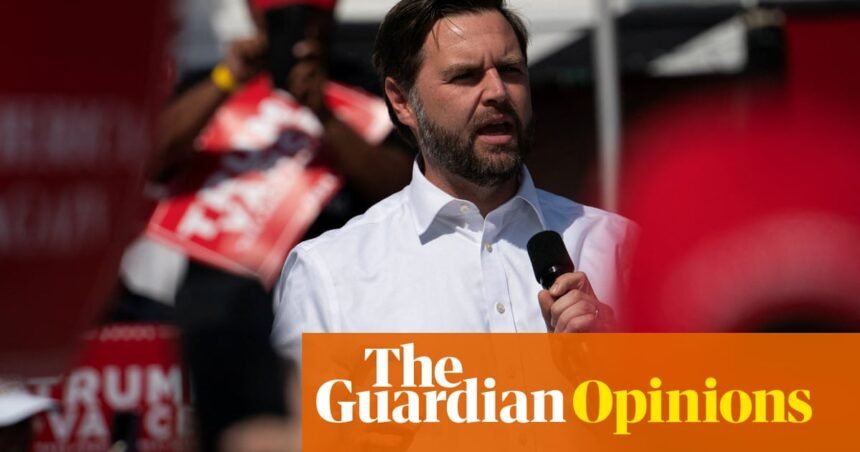The world is ablaze with issues, but in Washington DC, the spotlight is on Olivia Nuzzi. Her suspension from New York Magazine for sharing “demure” nude photos and inappropriate messages with Robert F. Kennedy Jr. has sparked laughter amidst the stressful backdrop of a close electoral race.
Nuzzi’s situation parallels the Supreme Court’s stance on presidential immunity, marking the distinction between Donald Trump’s “private” and “official” actions during the January 6 insurrection. In a striking contrast, the blonde journalist faces more reprimand for sexting than Trump does for his coup attempt.
Amidst the gossip storm, a revealing conversation took place between two friends. “There’s this weird sex scandal story going on right now,” mused one. “The media is obsessed, but I don’t think there was any actual sex involved.” His friend responded, “That’s how I’m sure it is,” leading to uproarious laughter. These jesters are none other than Republican VP candidate Senator JD Vance and Tucker Carlson, the former top Fox News host, now navigating the chaotic waters of social media after his dismissal.
Vance recently appeared with Carlson, seemingly unfazed despite Carlson’s controversial guest appearances. While discussing Nuzzi, he swiftly pivoted to a sprawling conspiracy theory linking Joe Biden, Kamala Harris, and the entire press corps. Vance claimed Biden was “sleepwalking into World War III,” attributing his presidency to Harris’s alleged dishonesty regarding his mental acuity. “If you care about the truth,” Vance asserted, “leave salacious nonsense to the tabloids.”
Thus, the narrative that Nuzzi has become the distraction from Vance’s broader conspiracy theories unfolds. Vance’s concerns veer towards the ramifications of being embroiled in potential global conflict, likening it to a meme. Even in jest, he clumsily framed his anxieties about nuclear threats while Carlson maintained a solemn silence.
Vance seemed to introduce a new angle to the “great replacement” theory, scapegoating Liz and Dick Cheney for promoting foreign labor influx for corporate benefit. He disregarded the Cheny’s fall from grace or the Cheneys’ long absence from political arenas. In a strikingly convoluted manner, he noted, “Do you think the U.S. should offload its industrial base to countries that may not have our best interests in mind?”
After a shallow two-part discussion, during which he intertwined his bizarre hinging on Kennedy in a supposed scandal, he returned to his Springfield, Ohio anecdote, which he used as a warped illustration of his theory. Both he and Tucker shared a humorous agreement, reveling in their own absurdity.
As Trump deliberated on whom to select as a running mate, Carlson emerged as a significant influencer. His relationships within Vance’s apprenticeship and his tightening grip on Trump’s choices cemented him in the political theater. Meanwhile, Vance admitted to past doubts about Trump, having called him “an idiot” and “unfit for office.” Yet, in a stunning pivot, Carlson stoked paranoia over potential presidential threats, enhancing Vance’s standing with Trump through his fervent defense.
In the midst of campaign antics, Vance commended Carlson’s hackneyed praises of Trump, drawing eerie parallels to lines from “The Manchurian Candidate.”
Vance, a construct of image and adaptability, remains a source of curiosity. His upbringing, chronicled in “Hillbilly Elegy,” reveals a layered identity shaped by abandonment and survival. He adopted different names throughout his life, with JD Vance becoming synonymous with his political persona.
Mentorship marked Vance’s journey, consistently shape-shifting to align with each new influence. His ties to Peter Thiel, crypto magnate and anti-democracy figure, only advance his political aspirations. Thiel’s financial backing of Vance during Senate runs indicates a larger alliance underscoring their shared interests.
Vance’s shift in religious belief to Catholicism parallels his political evolution towards post-liberal ideologies. This metamorphosis interlinks with figures like Patrick Deneen, who advocates for a reactionary agenda, emphasizing a shift toward traditionalism against progressivism.
Through these various maneuvers, Vance signals allegiance to darker strands of the political landscape, intertwining himself with deeply reactionary ideologies. His debates reveal a stark contrast between jest and an alarming embrace of authoritarian rhetoric that seeks to undermine traditional democratic principles.
JD Vance’s banter with Tucker Carlson often devolves into juvenile humor, but beneath it lies a calculated strategy. By mirroring the language of radical circles to earn approval while simultaneously engaging in disparaging quips directed at opponents, Vance seeks to solidify his position.
In a façade of humor, both Vance and Carlson delve into bizarre political commentary that serves to bolster their narratives while deflecting from deeper political discourse. Their mutual mocking of established norms reflects a wider trend towards populism that supports the Trumpian brand while engaging in a disconcerting fantasy of governance.





